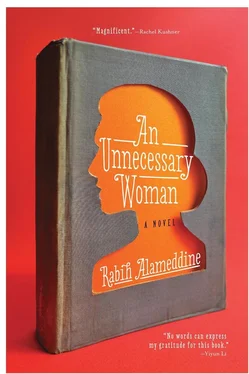Apollo, ever the alchemist, still sails his chariot in the skies of Beirut, wielding a philosopher’s stone. Into gold I transmute the very air.
You must change your life.
The surprising sound of Marie-Thérèse’s strapless sandals floats through the window — surprising since my downstairs neighbor hasn’t made the trek upstairs in a long while. After she passes the window, I lean over to observe. She doesn’t seem to be dragging her shadow and isn’t wearing a mourning dress. It takes me a moment to remember that this is the day after the one-year anniversary of her husband’s death. As my heels return to the floor, I realize my neck has stiffened.
Fadia’s voice descends from above. “Well done, my love, well done. I’m proud of you.” The voice sounds invigorated, as if its owner has been dunked in an Italian fountain of joy.
The coffee klatsch is reuniting this morning. Good for them.
The three witches have been having syrupy coffee together every morning for almost thirty years. On the third-floor landing, in front of Joumana’s apartment, my neighbors gather around the round brass tray, smoking, gossiping, and getting ready for the day. Marie-Thérèse hasn’t sat on her stool at all in the last year — a bit too much mourning, if you ask me, but understandable. That she’s making the trek upstairs is a grand occasion.
“You light up the day,” Joumana calls down. Her voice rings out along the stairwell and drops right into my kitchen.
It’s a glorious, gilded Levantine morning.
The acoustics in the building are such that in my kitchen I hear every word spoken on the landing. Every morning, I hover intimately among my neighbors. I hear the clink of cups on their saucers, the clank of saucers on the brass tray, the pouring of the coffee, their sacred ritual—“irrigating the Garden,” Joumana calls it. I hear them chatter and gossip: Have you heard this? Can you believe that? They curse enemies and laud friends. I hear every sigh and giggle. I listen to them make plans, compare notes, exchange recipes, and exhibit every newly purchased inessential.
Years of conversation.
So many mornings: Fadia unleashing her frightening trademark laugh, a crackling falsetto exhalation that makes her elongated throat swell and undulate like a baker’s bellows, a wild and epidemically infectious laugh, and she’s prodigal with it. Joumana’s husband putting his head out the door; he good-mornings the women, jokes with them, and shouts down to Mr. Hayek, Marie-Thérèse’s husband and tormentor, in the apartment below mine to make sure he’s ready for their walk to the American University, where they both teach. Joumana teaches at the university as well, but she drives her car and never rushes her coffee. She pokes fun at the men because most days they walk in a dawdling mosey and she picks them up along the way. “They want exercise,” she says, “but not perspiration.”
Poor Mr. Hayek no longer makes that walk.
I pick a fragrant mandarin out of the bowl, poke a hole in its bottom with my finger, and begin to peel. I pour myself a second cup of tea.
“I’m so happy you’re out of mourning,” Fadia says. “A year is too much.”
I concur, of course. A year is too much if you loved your husband. It is much too much for Mr. Hayek.
“I understand why you chose to do it,” Fadia goes on. “I’m with you, my love. But I say six months — six months is more than enough. I loved my husband, everyone will vouch for that, but I couldn’t keep wearing black.”
“I didn’t mind the black,” Marie-Thérèse says. A loud car horn from the street obscures her next sentence.
“It’s better that you took it off,” Joumana says. “He’d have wanted you to. Your husband hated black.”
“And don’t wear those black nylons anymore,” Fadia says. No car horn, no backfiring truck or rumbling motorcycle, is able obscure her voice. “Although they do cover a lot.”
“Fadia!” Joumana admonishes.
“What? Don’t look at me like that. Fadia tells the truth. You know that. I think we could all use a little depilation. That’s all I’m saying. Am I lying? Tell me. No, I most certainly am not. We all need a good pedicure as well. Am I right? Am I right? This evening we’ll all go to the salon. Just the essentials, that’s all. Top to bottom. And you know, my love, unshaved legs are contagious. If we don’t do something about yours, who knows what will happen to mine? It’s even worse with unpedicured nails. Look, look.” Fadia’s voice hoots and shrieks. “The color is chipping as we speak. We need an emergency intervention.” Fadia, who always enjoys her own joke, laughs, the crackling falsetto.
“Girls’ night out,” Joumana says.
“We can be young again,” Fadia adds.
At sixty-two, Fadia is the eldest of the three. I, of course, am much further along. She isn’t aging gracefully; she fights every slight sign of decay with vigor and bitterness. Her makeup keeps getting thicker and her fashions more adolescent, a late desperate grasp at a fondly recalled youth. Even so, she looks younger and fresher than Marie-Thérèse, ten years her junior, who is aging without bitterness and with obvious resignation. Her elbows have collected as many furrows as a walnut, as many furrows as mine. She’s become a paltry imitation of what she once was. Her eyes settled into incuriosity a long time ago.
Marie-Thérèse has an inscrutable face, a life-is-but-a-dream look giving the impression that she wishes not to be disturbed by disturbing realities — a mask, really, for the impression is not true, the facade doesn’t match the house it conceals. For some reason she reminds me of the girl Fernando Pessoa tried to befriend, the single romantic liaison in his life. I can’t tell you why. I don’t know what that girl looked like. I’m not sure anybody does. I can’t even remember her name — Blanca, Maria, Francesca? My memory wishes to frustrate me this morning. The girl worked in the same import-export office as my poet, and he considered asking her out, or whatever hopeful twosomes did back in 1929 Lisbon.
I must say, I imagine that Marie-Thérèse looks like that girl as she aged, not as she was when the genius considered her.
Of course, Pessoa didn’t go out with that girl, didn’t do whatever they did back in 1929 Lisbon. Her name was Ophelia Queiroz. I am growing senile. Forgetting an Ophelia? The liaison’s brevity was due to the malicious interference of none other than Álvaro de Campos, Pessoa’s own creation, one of the seventy-two literary identities he used, the bisexual dandy who loathed Ophelia and believed her to be a distraction to Pessoa’s literary ambition. He wrote the poor girl and told her to flush any ideas she had about a relationship with Fernando down the toilet.
There is no evidence, at least none that I know of, that Ophelia had any idea who Fernando was, let alone that he spent his time inventing literary personas that wrote some of the great masterpieces of the twentieth century. She worked in the same clerical office, but I can’t imagine that they ever exchanged words. I can’t imagine him exchanging words with anybody.
Fernando died in relative obscurity, a virgin and a recluse.
I thought I’d be reading a new book today, but it doesn’t feel right, or I don’t feel like it. Some days are not new-book days.
After reading Sebald yesterday, I realized that translating Austerlitz was an easier project than The Emigrants , possibly because the latter laid the bitumen, smoothed the ride, for Austerlitz . A troublesome issue arises in translating Sebald into Arabic. His style, drawn-out and elongated sentences that wrap around the page and their reader, seems at first glance to be an ideal fit for Arabic, where use of punctuation is less formal. (Translating Saramago’s The Year of the Death of Ricardo Reis was a relative breeze.) However, Sebald’s ubiquitous insertion of Jacques Austerlitz’s tongue into the unnamed narrator’s first-person narrative was difficult to convey precisely, since Arabic, like Spanish, drops pronouns more often than English or German. Sebald’s I spoke for at least two people.
Читать дальше












